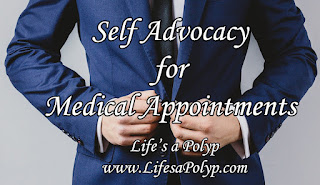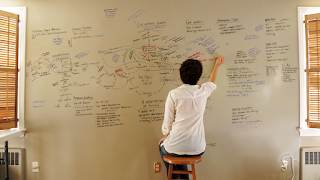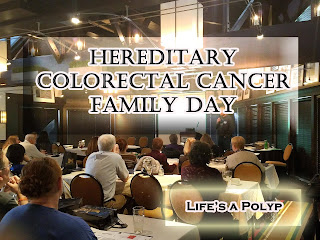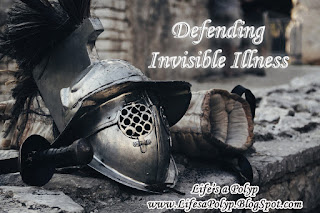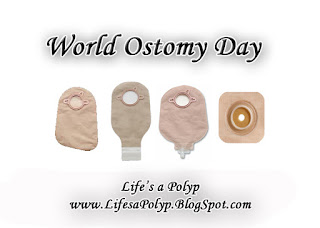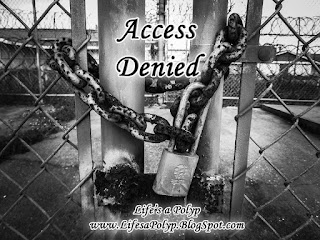Self advocacy is often a trial by error skill that we learn out of necessity with chronic illness. Each encounter with a medical provider may be different and can be a teaching opportunity for us. Studies have shown that the more someone is motivated to be involved in their healthcare, the better health outcomes a person has. Self advocacy quite literally can make the difference in better or poorer health.
I've been fortunate to be able to learn from my mother as I watched how she managed not only her own health with Familial Adenomatous Polyposis but also how she managed my medical appointments when I was a child and teen with the same health issues. I watched her in her dealings not only with medical providers but also the insurance and medical supply companies. My mother is a fierce advocate and I learned a lot over the years from her. Here are my best practices that I use for myself for my medical care.
- Research
Knowing about one's health conditions and symptoms is vital not only for personal knowledge and self-advocacy but also to improve coping and adjustment to health issues. Giving up control of one's healthcare management to providers without any input or understanding of health conditions and treatments allows for opportunities for treatment options to be missed.
Gathering information from various sources increases the identification of possible health conditions causing new or worsening symptoms, alternative treatment options that haven't been tried yet, and different medical tests to request.
For instance, I abruptly started having chronic nausea in 2015 after a hospitalization. The standard treatments of oral Zofran or Phenergan were not effective in controlling my nausea. I researched other medications and remedies for controlling nausea and I asked my online medical communities what has worked for others with chronic nausea. After a lot of trial and error and trying various over the counter and prescription options with my doctor, I was able to effectively control my chronic nausea with Compazine and peppermint oil. If I hadn't researched other options and requested my doctor to prescribe medications I was requesting, I wouldn't have been able to find a tolerable solution to my nausea management. I do the same with requesting medical tests and procedures to be conducted when I'm having a new or worsening symptom - whether that's a lab test or procedure such as a scope or imaging test.
- Specialists vs. Primary Care
- Gastroenterologist manages my GI rare diseases and everything that comes with them and the GI organs I'm missing as a result. He monitors my lab values regularly, adjusts medications as needed, completes my upper and lower scopes on a regular basis, monitors my liver, etc.
- Hematologist manages my anemia. While my GI Specialist is able to manage my anemia through oral medication and iron infusions/transfusions as needed, a Hematologist specializes in blood disorders and has an even better understanding of my anemia than my GI specialist.
- Nephrologist monitors my kidney. I have renal cysts that she monitors via ultrasound annually, treats my UTIs, and monitors my lab values regularly. She manages my Vitamin D. While my GI Specialist is able to manage my Vitamin D levels and medication, Vitamin D and the kidneys are intertwined providing my Nephrologist a better understanding of this connection.
- Neurologist manages my Abdominal Migraine. Once I obtained a neurological disorder diagnosis, my Neurologist began managing my medications to treat the Abdominal Migraine including the pain and nausea that it causes. Previously, my GI specialist was ordering my Lyrica and nausea medications when we believed it was solely a GI issue.
- Endocrinologist monitors my thyroid. With FAP, a yearly ultrasound of the thyroid is needed to monitor for cancer risks. She also monitors my thyroid via labs as well.
- Gynecologist not only monitors my reproductive health but she also monitors my hormones to ensure my estrogen is within range and not worsening my Abdominal Migraine. My organs are adhered to my abdominal wall and pelvis by scar tissue and I have a large ovarian cyst, she monitors these issues to determine if either are attributing or worsening my pain levels and to treat the issues as indicated.
- Dermatologist monitors and treats any skin issues I have. While I don't require regular appointments at this time, she has treated me for cysts and scars from my abdominal surgeries that weren't healing.
- Request and Review Medical Records
- Track Symptoms in Detail
- What the symptoms are and what they feel like
- When they started, changed, or stopped
- Duration of symptoms
- What affects the symptoms - medications, foods, etc
- Keep a List of Everything to Discuss at Appointments
- Create Online Accounts with Medical Providers
- Maintain Regular Communication with Providers
- Avoid HMO Insurance Plans
- Obtain Consultations
- Ask About Differential Diagnosis
- Request Explanation and Documentation of Denied Medical Requests
- Change Providers

